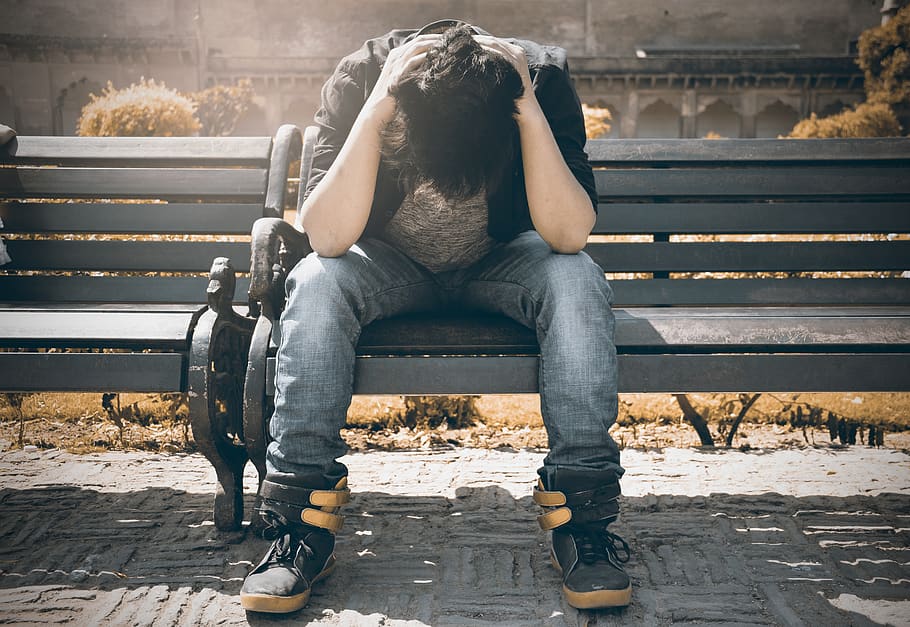When I was in college, I experienced depression for about a year and a half as a sophomore and into my junior year. I remember staying in bed crying all evening and into the night, then waking up in tears again the next morning. These crying spells occurred every single day! I felt really sad and uninterested in doing activities with my peers. My friends thought I was crazy and didn’t understand my behaviors. At the time, I didn’t know I was depressed. I just never thought of it. I only dwelled on the painful experiences that haunted me and kept me in a constant state of sorrow and sadness. These negative feelings were driven by the immense stress I felt regarding my academic work and the challenges I faced to decide on a career path, but mainly, my heartache came from a romantic relationship where I was rejected by my someone who I thought I was “in love” with. Navigating these hardships was overwhelming and I wasn’t aware of the access I had to college resources to help me identify my depression and work through it. After a long while, I eventually came out of those heavy feelings with the help of church lessons and involvement in a positive community. However, I wish I had taken advantage of resources that were available to me during my college tenure to come out of those negative spaces (depression/sadness) much faster. My previous experiences serve as the motivation behind this post as my goal is to help YOU understand and overcome depression or persistent feelings of sadness so that you can be feel better and happier while in college.
What triggers depression in college?
While depression is a clinically diagnosed disorder that is characterized by a chemical imbalance in the brain, like general feelings of sadness, it can be triggered by life circumstances or situations that lead people to experience these feelings. As a college student, situations that spark depression or persistent feelings of sadness can be the result of any of the following, to name a few:
- the rigors of your academic work
- difficulties with romantic relationships and friendships
- feelings of isolation, loneliness and lack of a sense of belonging
- homesickness
- navigating autonomy
- money struggles
- confusion about self-identity and life purpose
What is depression and what does it look like?
If you recall the movie “Get Out”, the main character falls into a “sunken place”, a dark hole he continues to plunge into while kicking and screaming in the air, fighting to save himself from dropping deeper into the hole. This constant struggle is what depression can feel like for some people. It leaves people feeling paralyzed in their own mind and body.

Depression is a huge issue that affects 300 million people worldwide! One in five people will experience depression at some point in their lives. It is said that if you experience at least five of the listed symptoms, you may be suffering from depression:
- Feelings of hopelessness, helplessness, emptiness or worthlessness
- Easily irritated and frustrated
- Anxiety
- Slowed behavior both physically and mentally
- Loss of interest in daily activities and hobbies
- Loss of appetite
- Lack of energy
- Abnormal sleeping patterns, lack of sleep or too much sleep
- Frequent thoughts of death and suicide
Take caution! People around you may observe your demeanor or your behaviors and wave you off as being “too dramatic” about your current state or things you may be going through if you feel sad or depressed. Others may not understand the realness and seriousness of what you are experiencing. Just know that you are NOT being too dramatic.. your feelings and experiences are valid and you did not choose to experience depression.
Who gets depressed?
Depression affects everyone! It does not discriminate. You can be the strongest, happiest, most energetic person in the eyes of others.. or even yourself, but life circumstances can trigger a physiological condition or chemical imbalance in the brain which can lead to depression. Depression and immense sadness doesn’t “favor” men and only impact women, anyone across the gender spectrum can experience depression. It isn’t limited to particular racial or age groups… again, all sorts of people can become depressed.
Why is understanding depression important?
I wrote this blog to highlight the importance of raising awareness about depression among college students. Society tends to stigmatize depression and misunderstand people who suffer from this disorder. However, keep in mind that depression is a totally common condition and discussions surrounding it should be welcomed and normalized. Too many suicides occur each year, with roughly 800,000 victims! It becomes super important to tackle depression to lessen the chances of facing suicidal thoughts and actions.
Addressing persistent feelings of sadness and depression is important because without addressing it, you become susceptible to additional health issues that will impact your overall performance in college. Learning to talk about and understand depression and sadness is important to learn now while you are in college. By doing so, you become better prepared for the more difficult situations and circumstances you’ll likely face as you progress in life, so learning about resources and gathering insights now will be of great benefit to you.
Here’s how to cope with depression and sadness:
1. Shape your mindset. Watch inspirational or motivational videos and talks that will get you thinking more positively and can offer you a better perspective on life. Attend leadership programs or go to church to get encouraging messages.
2. Take good care of yourself. Do not over-study. Avoid binge drinking. Eat healthy foods. Exercise to release endorphins which produces positive feelings in your body. Get a good night’s sleep as it can help to ward off depression. Also, prioritize your time and attention. Don’t make second things first.
3. Avoid isolating yourself. It’s not an easy thing to do, to enter spaces where others are because you may feel guilty about putting a damper in the mood of the group. However, it can be helpful to connect with others. Staying isolated for long periods of time may cause you to dwell on your pains and may introduce additional negative thoughts and feelings. Changing environments can expose you to new stimulations and conversations that may support your healing.
4. Take advantage of campus resources. Visit the counseling center of your college or university. Most times, you can speak to a counselor for free to talk through the difficulties you’re facing in college. A counselor can help you address some negative feelings and even guide you in shaping your mindset. Counselors can also refer you to additional support agents who can help you manage other concerns or needs you may have.
5. Talk to trusted, loved ones. These folks can offer you the moral support you need to remain resilient. Life is not meant to be done alone. Let others help you. Express your deep thoughts and feelings with trusted individuals to get the satisfaction of being heard, validated and supported.
Feel free to share your experiences with persistent sadness or depression in college. Do you know someone dealing with this? What tips can you offer? What has helped you overcome this challenge?
For more information, visit YouTube Channel: College Life on Fleek






